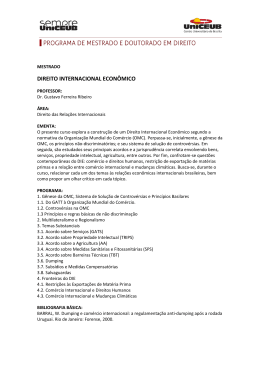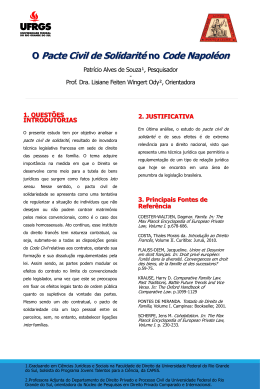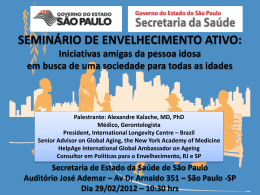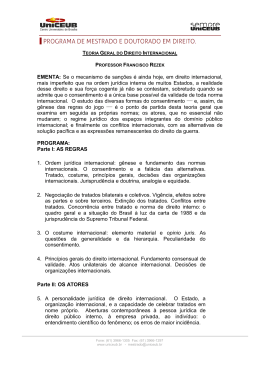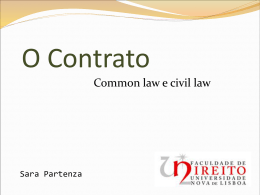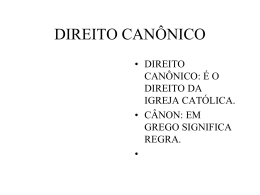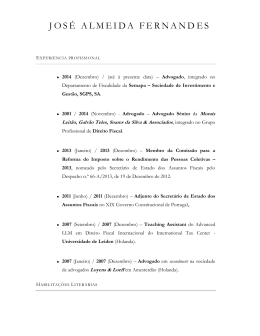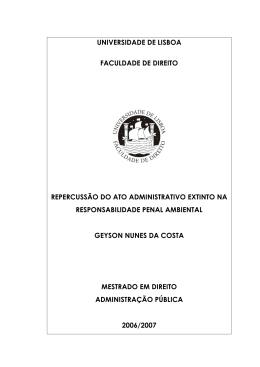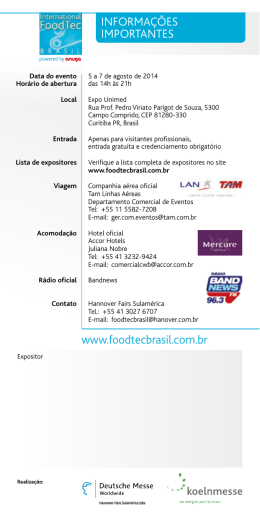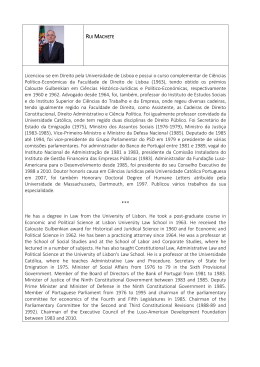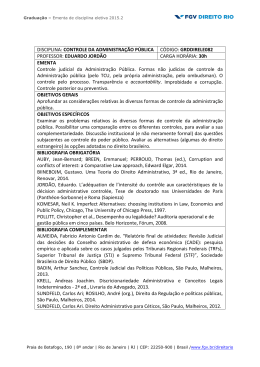MESTRADO ÁREA: DIREITO DAS RELAÇÕES INTERNACIONAIS CURSO: DIREITO INTERNACIONAL ECONÔMICO – 2.SEM.14 (PLANO PRELIMINAR) PROFESSOR: DR. GUSTAVO FERREIRA RIBEIRO EMENTA: O presente curso explora a construção do Direito Internacional Econômico na perspectiva da normativa da Organização Mundial do Comércio (OMC). Perpassa-se, inicialmente, a gênese da OMC, os princípios nãodiscriminatórios e seu sistema de solução de controvérsias. Em seguida, são estudados seus principais acordos e a jurisprudência correlata envolvendo bens, serviços, propriedade intelectual, agricultura, entre outros. Ao final, confrontam-se questões contemporâneas do DIE: comércio e direitos humanos, restrição de exportação de matérias primas e a relação entre comércio internacional e mudanças climáticas. Busca-se, durante o curso, relacionar cada um dos temas às relações econômicas internacionais brasileiras, bem como propor um olhar crítico em cada tópico. Os encontros 1 e 15 são reservados para a introdução e fechamento da disciplina. ENCONTRO 01 RIBEIRO, G. F. The Syllabus Problem: Determining the Teaching Scope of International Economic Law. Position Paper. PEPA Conference. FGV: São Paulo, 2014. BHAGWATI, Jagdish. Por que o livre comércio é importante. Valor Econômico, 4 Jul. 2011. 3p. RODRIK, Dani. Trading in illusions. Foreign Policy Magazine. Washington, Carnegie Endowment for International Peace, Abril/Maio 2001, p 54-62. INCLUIR Leitura sobre Cadeias de Valor (2014). 1. Gênese da OMC, Sistema de Solução de Controvérsias e Princípios Basilares ENCONTRO 02 1.1. Do GATT à Organização Mundial do Comércio 1 JACKSON, John Howard. The world trading system: law and policy of international economic relations. 2. ed. Cambridge: MIT Press, 1997, p. 3158; 73-78. BARRAL, Welber. De Bretton Woods a Doha. In: BARRAL, Welber (org.). O Brasil e a OMC. 2ed. Curitiba: Juruá, 2002, p. 9-26. Complementar: STIGLITZ, Joseph. Globalization and its discontents. Penguin, 2002, p. 59-67; 244-252. ENCONTRO 03 1.2. Controvérsias na OMC BARRAL, Welber. Solução de controvérsias na OMC. In: KLOR et al. Solução de Controvérsias: OMC, União Européia e Mercosul. Rio de Janeiro: Konrad-Adenauer-Stiftung, 2004, p. 11-68. JACKSON, J. The WTO Dispute Settlement Understanding: misunderstandings on the nature of legal obligation in JACKSON, John H. The Jurisprudence of GATT and the WTO: insights on treaty law and economic relations. Cambridge: University Press, 2002. p. 162-167. Complementar: CHARNOVITZ, Steve. Should the teeth be pulled? An analysis of WTO sanctions. In: KENNEDY, D. and SOUTHWICK, J. (eds). The political economy of international trade law. Cambridge: CUP, 2002, p. 602-635. ENCONTRO 04) 1.3 Princípios e regras básicas de não discriminação GUIMARAES, Feliciano de Sá. O fim do tratamento diferenciado e a adoção da regra de reciprocidade para países em desenvolvimento na Rodada Uruguai da OMC. Rev. Sociol. Polit. [online]. 2006, n.27, pp. 77-105. ISSN 0104-4478 (disponível em http://www.scielo.org/php/index.php) NASSER, Rabih Ali. A OMC e os Países em Desenvolvimento. São Paulo: Aduaneiras, 2003, p. 235-254. Complementar: JACKSON, John H. The world trading system: law and policy of international economic relations. 2. ed. Cambridge: MIT Press, 1997. p. 157169; 213-224. VAN DEN BOSSCHE, Peter Van. The Law and Policy of the World Trade Organization: Text, Cases and Materials. CUP, 2005, p. 692-700. 2. Multilateralismo e Regionalismo ENCONTRO 05 CELLI JUNIOR, Umberto. Teoria Geral da Integração: em Busca de um Modelo Alternativo. In: MERCADANTE, Araminta de Azevedo et. Al. 2 Blocos Econômicos e Integração na América Latina, África e Ásia. Curitiba: Juruá, 2006, p. 19-37. Complementar: PRAZERES, Tatiana. Sistema Multilateral de Comércio e Processos de Integração Regional. 2007. 342 f. Tese (Doutorado): UnB, 2007, p. 167-195. (na forma de Livro: PRAZERES, Tatiana. A OMC e os Blocos Regionais. São Paulo: Aduaneiras, 2008, p. 259-301). JACKSON, John; DAVEY, William; SYKES, Alan. Legal Problems of International Economic Relations: Cases, Materials, and Text. 4 ed. West Group, 2002. P. 387-402. 3. Acordos Específicos ENCONTRO 06 3.1. Acordo sobre Serviços (GATS) CELLI JUNIOR, Umberto. Acesso a mercados em serviços. I: CELLI JUNIOR, Umberto & SAYEG, Fernanda M. (Orgs.). Comércio de Serviços, OMC e Desenvolvimento. São Paulo: IDCID, 2008, p. 1-18. RIBEIRO, G. F. Afinal o que a educação superior tem a ver com a Organização Mundial do Comércio. Revista Brasileira de Política Internacional, Brasília, v. 49, n. 2, 2006, p. 137-156. RIBEIRO, G. F. A serviço do desenvolvimento: as negociações sobre o comércio de serviços na OMC. Pontes, v. 3 n. 5, Out. 2007. ISSN 1813-4378. Disponível em: http://www.ictsd.org/monthly/pontes.htm. 2p. Complementar: KRAJEWSKI, Markus. Public Services and trade liberalization: mapping the legal framework. Journal of International Economic Law. v. 6, n. 2, Jun. 2003, p. 341-367. ADLUNG, Rudolf. Public Services and the GATS, Journal of International Economic Law, v. 9, n. 2, 2006, p. 455-485. ENCONTRO 07 3.2. Acordo sobre Propriedade Intelectual (TRIPS) PIMENTEL, Luiz Otávio. Propriedade Intelectual. In: BARRAL, Welber (org.). O Brasil e a OMC. 2 ed. Curitiba: Juruá, 2002. p. 47-64. CUNHA NETO, Loris Baena. A relação entre o direito internacional e o direito da organização mundial do comércio: o acordo TRIPS entre os sistemas jurídicos internacionais. 2004. 241 f. Dissertação (Mestrado): Curso de Pós-Graduação em Direito, Universidade Federal de Santa Catarina, 2004, p. 126-154. Complementar: CUNHA NETO, Loris Baena. Id., 2004, p. 188-206. 3 OMC. Doha Declaration on the TRIPS Agreement and Public Health. 2001. OMC. Protocol Amending the TRIPS Agreement. WT/L/641, 8. Dez. 2005. Disponível em: http://www.wto.org/english/tratop_e/trips_e/wtl641_e.htm OMC. Amendment Of The Trips Agreement – Second Extension Of The Period For The Acceptance By Members Of The Protocol Amending The Trips Agreement. WT/L/785, 21. Dez. 2009. ENCONTRO 08 3.3. Acordo sobre a Agricultura (AA) LUPI, André Lipp Pinto Basto; CARVALHO, Leonardo Arquimino de. Agricultura. In: BARRAL, Welber (org.). O Brasil e a OMC. 2. Ed. Curitiba: Juruá, 2002, p. 89-113. CEDRO, Rafael Rosa. Desenvolvimento Rural e a OMC: a Experiencia do Brasil. Curitiba: Juruá, 2011, 102-151. Complementar: DESTA, Melaku Geboye. The Law of International Trade in Agricultural Products, Kluwer Law International, The Hague, 2002, p. 5-9; 62-66; 99-103; 427-442. STEINBERG, Richard & JOSLING, Timothy. When the Peace Ends: The Vulnerability of EC and US Agricultural Subsidies to WTO Legal Challenge. Journal of International Economic Law, v. 6, n. 2, 2003, p. 369-385. 3.4. Acordo sobre Medidas Sanitárias e Fitossanitárias (SPS) ENCONTRO 09 RUIZ-FABRI, Hélène. A adoção do princípio da precaução pela OMC. In: VARELLA, M. e PLATIAU. A. Princípio da precaução. Belo Horizonte: Del Rey, 2004, p. 297-316 NOIVILLE, Christine. Princípio da precaução e OMC: da oposição filosófica para os ajustes técnicos? In: VARELLA, M. e PLATIAU. A. Princípio da precaução. Belo Horizonte: Del Rey, 2004. p. 317-350. Complementar: MARCEAU, Gabrielle Marceau & TRACHTMAN, Joel P., The Technical Barriers to Trade Agreement, the Sanitary and Phytosanitary Measures Agreement, and the General Agreement on Tariffs and Trade: Map of the World Trade Organization Law of Domestic Regulation of Goods. Journal of World Trade, v. 36, 2002, p. 811-881. ENCONTRO 10 3.5. Acordo sobre Barreiras Técnicas (TBT) PRAZERES, Tatiana. Comércio Internacional e Protecionismo: as Barreiras Técnicas na OMC. São Paulo: Aduaneiras, 2003, p. 65-139. RIBEIRO; SILVEIRA. Truth be Told: Acompanhem o TBT. No prelo. 2014. 4 Complementar: PRAZERES, Tatiana. Comércio Internacional e Protecionismo: as Barreiras Técnicas na OMC. São Paulo: Aduaneiras, 2003, p. 141-218. VAN DEN BOSSCHE, Peter et al. WTO Rules on Technical Barriers to Trade. Maastricht Faculty of Law Working Paper No. 2005-6, 2005, p. 4-26. ENCONTRO 11 3.6. Defesa Comercial: Dumping, Subsídios e Medidas Compensatórias BARRAL, W. Dumping e comércio internacional: a regulamentação antidumping após a rodada Uruguai. Rio de Janeiro: Forense, 2000, p. 7-17; 3442; 88-97; 177-225. REIS, Felipe Nagel. Subsídios na OMC. Curitiba: Juruá, 2008, p. 51-95. BROGINI, Gilvan Damiani. OMC e Indústria Nacional. São Paulo: Aduaneiras, 2004, p. 151-211. Complementar: OMC. United States – Anti-Dumping Administrative Reviews And Other Measures Related To Imports Of Certain Orange Juice From Brazil. WT/DS382/R. 25 Mar. 2011. JACKSON, John Howard. The world trading system: law and policy of international economic relations. 2. ed. Cambridge: MIT Press, 1997, p. 279304. 4. Fronteiras do DIE ENCONTRO 12 4.1 Restrições às Exportações RIBEIRO, Gustavo. Terras-raras, política industrial e o caso China. Valor Econômico, São Paulo, p. A12, 1-2 Nov. 2011. RIBEIRO, Gustavo. Restrições à exportação de matérias-primas, multilateralismo e implicações para o Brasil. PONTES: Informações e análises sobre comércio e desenvolvimento sustentável. VOLUME 8, NÚMERO 3 JUNHO 2012. INCLUIR DISSERTAÇÃO MARCO ALCÂNTARA ENCONTRO 133 4.2 Direitos Humanos e Comércio Internacional PETERSMANN, Ernst-Ulrich. Human Rights and International Economic Law in the 21st Century: the need to clarify their relationships. Journal of International Economic Law, v.4, n. 1, 2001, p. 3-39. RIBEIRO, G. The Legality of Trade Sanctions based on Human Rights Violations: An analysis through Law and Economics. Economic Analysis of Law Review, v. 3, p. 260, 2012. 5 Complementar: MARCEAU, Gabrielle. WTO Dispute Settlement and Human Rights. European Journal of International Law, v. 13, n. 4, 2002, p. 753-814. ENCONTRO 1414 4.2 Comércio Internacional e Mudanças Climáticas WTO. Background Note Trade And Environment In The WTO. 2010. Disponível em: http://www.wto.org/english/news_e/news09_e/climate_21dec09_e.pdf, 4p. DOELLE, M. Climate Change and the WTO: Opportunities to Motivate State Action on Climate Change through the World Trade Organization. Review of European Community & International Environmental Law, v. 13, n. 1, 2004, p. 85-103. GREEN, Andrew. Climate Change, Regulatory Policy and the WTO: How Constraining are Trade Rules? Journal of International Economic Law, v.8, n. 1, 2005. ENCONTRO 1514 Fechamento. METODOLOGIA E SISTEMÁTICA DE AVALIAÇÃO O curso compreende 45 (quarenta e cinco) horas de encontros semanais obrigatórios, com aulas e seminários. Após o quinto encontro, cada encontro é iniciado com uma exposição de um acadêmico com a duração aproximada de 1 (uma) hora e 30 (trinta) minutos, seguida de discussões sobre o tema pelo professor. Todos os alunos devem ter lido os textos obrigatórios que compreendem cerca de 40-80 páginas de leitura por semana, com exceções. Pressupõe-se leitura em língua inglesa para bom aproveitamento do curso. O aluno que apresenta o seminário da semana deve também ler outros textos e procurar identificar pontos de debate. A cada aula, todos devem apresentar a ficha de leitura do texto obrigatório. A sistemática das fichas será explicada em detalhes na primeira aula programada. Ao final do semestre, cada aluno deverá entregar artigo (10 a 20 páginas, espaço 1/2) sobre um dos temas apresentados no curso. Ocasionalmente, em turmas de número reduzido de alunos, o professor reserva o direito de alterar a metodologia e a sistemática de avaliação para melhor condução do curso. Neste caso, os novos critérios serão combinados no primeiro encontro da turma. A menção final do aluno será calculada da seguinte forma: 6 Perc. 50% Item Participação aluno 50% Artigo final geral do Critérios Quantidade de presença, qualidade da participação em aula, dos fichamentos e do seminário apresentado. A ser explicado no final do curso BIBLIOGRAFIA COMPLEMENTAR: Livros Bedjaoui, M. Pour un nouvel ordre économique international. Paris, Unesco, 1979, 295p. Bemudez, J. A. Z., R. Epsztejn, et al. The WTO TRIPS agreement and patent protection in Brazil : recent changes and implications for local production and access to medicines. Rio de Janeiro, WHO/Escola Nacional de Saude Publica/Fundação Oswaldo Cruz, 2000, 119p. Boyle, A., D. Freestone, Eds. International law and sustainable development. Past achievements and future challenges. Oxford, New York, New Delhi, Oxford University, 1999, 377p. Correa, C. M. Intelectual property rights and the use of compulsory licenses : options for developing countries. Trade-Related Agendas, Development and Equity. Genève, South Centre, 1999, 28p. Freestone, D., E. Hey, Eds. The precautionary principle and international law. The challenge of implementation. International Environmental Law and Policy Series. The Hague, London, Boston, Kluwer Law International, 1996, 274p. Rêgo, E. C. L. Do GATT à OMC : o que mudou, como funciona e para onde caminha o sistema multilateral de comércio. Brasilia, BNDES, 1996 Schwarzenberger, G. International law: as applied by international courts and tribunals. London, Stevens & Sons Limited, 1957, 808p. South-Centre. Issues regarding the review of the WTO dispute settlement mechanism. Trade-related Agendas, development and equity. Genève, South Centre, 1999, 36p. South-Centre. Special and differential treatment for developing countries in the WTO. Trade-related agendas, development and equity. Genève, South Centre, 1999, 36p. South Centre. The WTO multilateral trade agenda and the South. Genève, South Centre, 1998, 136p. WWF et alii. Dispute settlement in the WTO : A crisis for sustainable development. Discussion paper, 1998, 15p. Youssef, H. Special and differential treatment for developing countries in the WTO. Traderelated agendas, development and equity. Genève, South Centre, 1999, 36p. Zarrilli, S. WTO sanitary and phytosanitary agreement : issues for developing countries. Trade-related agendas, development and equity. Genève, South Centre, 1999, 27p. Artigos Baalakrishna, P. “ The need for a “ TRIPS PLUS “ regime “ Biotechnology and Development Monitor, 1998, 36, p.8 Buckingham, D. E., Phillips, W. B. “ Hot potato, hot potato: regulating products of biotechnology by the international community “ Journal of World Trade, 2001, 35(1), p.131. Chang, S. W. “ GATTing a green trade barrier - ecolabelling and WTO agreement on 7 technical barriers to trade “ Journal of Wolrd Trade, 1997, 31(1), p.137-159. Charney, J. I. “ International law threatened by multiple international tribunals? “ Recueil des cours. Académie de Droit International, 1999, 271, p.101-382. Fidler, Calibrating the Wealth and Health of Nations: Trade, Health, and Foreign Policy After the WTO's First Decade, 1 ASIAN J. OF THE WTO AND INT’L HEALTH L. AND POLICY 53 (2006). Feuer, G. “ L'Uruguay Round, les pays en développement et le droit interantional du développement “ Annuaire Français de Droit International, 1994, XL, p.758-775. Flory, M. “ Mondialisation et droit international du développement “ Revue Générale de Droit International Public, 1997, 101(3), p.609-633. Flory, T. “ Droit économique et coopération internationale. Chronique de droit international économique. Commerce “ Annuaire Français du Droit International, 1979, XXV, p. 580-602. Footer, M. E. “ Developing country practice in the matter of WTO dispute settlement “ Journal of World Trade, 2001, 35(1), p.55-98. Henkin, International Law: Politics, Values and Functions, in IV COLLECTED COURSES OF HAGUE ACADEMY OF INTERNATIONAL LAW (Hague Academy ed., 1989). Hernández-Lopez, E. “ Recent trends and perspectives for non-state actor participation in World Trade Organization disputes “ Journal of Wolrd Trade, 2001, 35(3), p.469-498. Howse, R. “ The turtles panel. Another environmental disaster in Geneva “ Journal of World Trade, 1998, 38(5), p.73-100 Hudec, R. E. The relationship of international environmental law to international economic law. In F. L. Morrison and R. Wolfrum. International, regional and national environmental law. The Hague, London, Boston, Kluwer Law International, 2000, p.133166 Joseph, S. “ Taming the Leviathans : Multinationals enterprises and human rights “ Netherlands International Law Review, 1999, XLVI(2), p.171-203 Marceau, A Call for Coherence in International Law: Praises for the Prohibition against ‘Clinical Isolation’ in WTO Dispute Settlement, 33(5) J.W.T. 87 Palmeter, D., P. C. Mavroidis. “ The WTO legal system : sources of law “ American Journal of International Law, 1998, 92(3), p.398-413 PAUWELYN, CONFLICT OF NORMS IN PUBLIC INTERNATIONAL LAW: HOW WTO LAW RELATES TO OTHER RULES OF INTERNATIONAL LAW (Cambridge, 2003a) Pauwelyn, The Role of Public International Law in the WTO: How Far Can We Go?, 95 AM. J. INT’L. L. 535 (2001). Petersmann, Human Rights, Markets and Economic Welfare: Constitutional Functions of the Emerging UN Human Rights Constitution, in INTERNATIONAL TRADE AND HUMAN RIGHTS: FOUNDATIONS AND CONCEPTUAL ISSUES 29 (Frederick M. Abbott et al., University of Michigan Press, 2005). Petersmann, Time for a United Nations ‘Global Compact’ for Integrating Human Rights into the Law of Worldwide Organizations: Lessons from European Integration, 13(3) EUR. J. INT’L L 621 (2002). Phillips, P. W. B., W. A. Kerr. “ Alternative paradigms. The WTo versus biosafety protocol for trade in genetically modified organisms “ Journal of World Trade, 2000, 34(4), p.63-75 Schefer, Chilling The Protection Of Human Rights: What The Kimberley Process Waiver Can Tell Us About The Wto's Effect On International Law 1, 22-23 (Nccr Trade Regulation Working Paper No. 2007/03, Jan. 01, 2007), Http://Ssrn.Com/Abstract=1094619 8 Shelton, D. Introduction : Law, non-law and the problem of 'soft law'. In D. Shelton. Commitment and compliance. The role of non-binding norms in the international legal system. Oxford, Oxford University, 2000, p.1-20 Shin, Y. “ An analysis of the WTO agreement on the application of sanitary and phytosanitary measures and its implementation in Korea “ Journal of World Trade, 1998, 32(1), p.85-119 Slaughter, A.-M. International law and international relations. In A. d. D. International. Recueil des cours. La Haye, Martinus Nijhoff. 285, 2000, p.9-250. Slaughter & David T. Zaring, Extraterritoriality in a Globalized World 2 (1998), available at SSRN http://ssrn.com/abstract=39380. *** 9
Download
